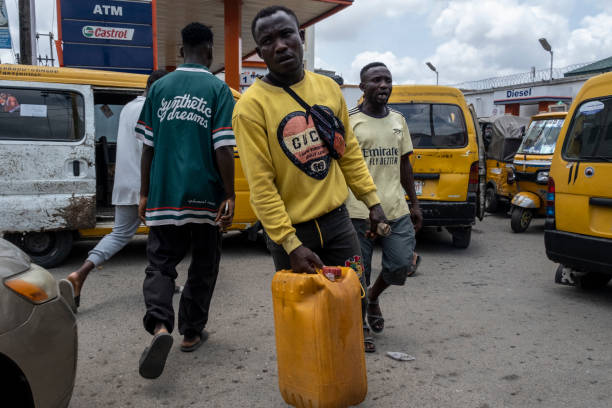
For many, it was the latest measure to eat into their budgets as President Bola Ahmed Tinubu’s government introduces reforms aimed at reviving the economy of Africa’s most populous nation. (Photo by FAWAZ OYEDEJI / AFP) (Photo by FAWAZ OYEDEJI/AFP via Getty Images)
Following the increment of Premium Motor Spirit pump price by the Nigerian National Petroleum Company Limited, residents of Osun State expressed anger on Wednesday as most of the filling stations in Osogbo and some other towns sold petrol for over N1,000 per litre.
The development has generated widespread condemnation as residents lamented the hardship the incessant increase in fuel prices has brought upon them.
The dramatic price hike has left many residents frustrated and struggling to cope with the escalating cost of living.
Despite the inflated price, long queues were seen at some filling stations, with motorists and commercial drivers expressing their outrage at the exorbitant prices.
Checks at some filling stations in Osogbo and Ile-Ife revealed that petrol was sold between N950 to N1050.
At Al Fajr filling station, Ogo Oluwa, a litre of fuel was sold for N1050.
Many blamed the government and fuel marketers for the situation, accusing them of exploiting the people during a difficult economic period.
“This is unbearable,” lamented Adewale, a commercial driver in Osogbo.
“How are we supposed to survive when we have to buy fuel at over N1000 per litre? It is not just about the fuel; everything will go up now—transport fares, food prices, and basic goods. The government needs to step in and address this immediately,” he added.
The sudden spike in fuel prices has also led to a ripple effect in the cost of transportation, with many commercial drivers already increasing their fares.
“This is totally bad. The roads are not even good. We are planning to officially increase the transport fare by next week. Things can’t go on like this,” a transport worker in Ile Ife, Ridwan Onifade, disclosed.
However, residents who rely on public transport have been particularly hard-hit, with some forced to walk long distances or cancel planned trips due to the higher costs.
Local businesses, particularly small and medium-sized enterprises, are also feeling the strain. Many business owners fear that the rising cost of fuel will lead to higher operational costs, which could result in reduced profits, layoffs, or even closures if the situation persists.
“I am not happy with the situation. The fuel price is very unbearable. I am very sure that the price of commodities will increase by next week,” a business owner, Mrs Ademarati, said.
The Guardian observed that many car owners in the civil and public service have abandoned their vehicles and boarded public transportation over the exorbitant fuel price.






